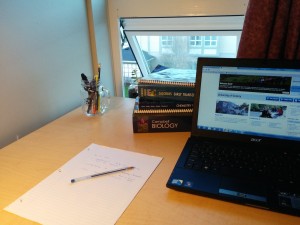Midterms: A few words of advice
 MIDTERMS, MIDTERMS AND, GUESS WHAT? …MORE MIDTERMS. In case you haven’t guessed already, this post is going to be about terms, and what comes midway in them (midterms, in case that wasn’t apparent).
MIDTERMS, MIDTERMS AND, GUESS WHAT? …MORE MIDTERMS. In case you haven’t guessed already, this post is going to be about terms, and what comes midway in them (midterms, in case that wasn’t apparent).
If I’m honest, they’re a great tool when used correctly. In the next week, I have three midterms so I apologize if my tone comes across as yelling, because I am quite exasperated by them; however, I’ll try to put that aside as I explain how to prep for a midterm and the benefits of doing so.
1. GO TO CLASS AND LEARN:
IF YOU HAVEN’T ALREADY, GET YO A$$ TO CLASS! I had a friend in the last semester–key word “had”–who wouldn’t show up to class and assumed by reading the textbook they would be fine. They were not fine. Professors are professors for a reason; they understand how to teach material they have been studying for decades, so learn from them. They know which concepts are important and which concepts can be misleading and will teach accordingly.
Paying for a class and not showing up is like renting a hotel room, but sleeping on the bench outside. It just doesn’t add up. Professors usually drop hints about midterms and exams closer to their dates during a lecture, so pay attention for those as well.
2. MAKE A SCHEDULE:
If you are like me, you have several midterms back to back, so it is important to schedule your time efficiently. This will help you understand how much time you need for each subject and enable you to prepare fully for each.
3. START EARLY:
This relates to making a schedule. Once you have a schedule and realize how much time you need to invest, make sure this is done when you actually have the time to study and not the night before. This is something I had to adjust to coming from high school.
In university, you cannot have the mindset that “you have enough time.” With labs, assignments and clubs, the week goes by quickly and can catch you out rather suddenly. As compared to high school, it appears you have more free time but you don’t. You really don’t, so try to revise your notes every day after class and eventually it will become a habit.
4. GO TO THE GYM:
I’m sure you’ve all heard of the freshman 15 (the university is conducting an experiment about it right now). In high school, whether you realized it or not, P.E. (physical education) helped to re-energize you between classes and prevented the freshman 15 from happening; it kept you in equilibrium.
In university, that is your responsibility. You don’t have to go the gym; maybe go for a jog, or a walk around campus, or even play some football in the quad during the evening. Try to fit a routine into your week that can act as constructive study breaks with the added benefit of keeping you fit. The weekly intramurals run by the university are a great option.
5. EAT HEALTHY AND CONSISTENTLY
Don’t miss meals as that will make it harder to focus in class. Eat protein-rich snacks, such as nuts, and drink plenty of water while studying.
People forget that the body consumes a lot of energy while studying and, by consuming these snacks, you can extend a 2 hour study session where you feel burnt out at the end, to a 5 hour session in which you are focused.
Having a clean and organized study spot can make a huge difference. Having an organized space will help you find things more easily and focus on the task at hand.
Pleasant and fresh smells can also make studying more relaxing. This is ultimately the goal when you study, but you still want to be able to draw a line between your place of rest and place of study.
When you sleep, you want to be at peace. If you study in your room often, you will notice that you carry the stress of studying into your sleep as you remain in a study mindset. So try to find different and unique study spots when you can.
7. FAMILIARIZE YOURSELF WITH THE EXAM HALL
This is a tip I had to learn the hard way during a chemistry midterm. Make sure you know which lecture hall in which your midterm is being held and become familiar with the size of the desks and seats.
During the first semester of this year, I had my first midterm in the MacLaurin A140 Lecture hall which, for those of you who do not know, has ridiculously small desks. I’m talking about the size of an 8.5 by 11 inch sheet of paper – they are tiny. For me, this was a distraction as I couldn’t look at my exam, the bubble answer sheet and periodic table at the same time, nor could I have my calculator on the desk because it got in the way of all the sheets. I know I’m not supposed to make excuses, but I feel this hindered by performance in a midterm where I only had an hour.
The best advice I can give my fellow students is to go the lecture hall the night before and become comfortable with it. You already have enough to worry about, so don’t let the environment be another factor.
There are many more study tips, but I think that’s for another post. Before I conclude, I want to talk about the benefits of prepping really well for midterms. Essentially, it readies you for the final and creates less studying for you at the end of the semester. It addresses any problems and issues with certain concepts you have now and allows you to nip them in the bud before the final exam where they are worth more.
Think of the midterm as a final and treat it accordingly. By not preparing for the midterm, you will make mistakes, but not learn why they were made and most likely repeat them on the final. Finally, just do your best and don’t stress. If you end up doing poorly on a midterm, don’t waste your energy sulking over answers you could have gotten right. Turn it around and focus on how you can improve for next time and not make the same mistakes.
Also, the final is there to allow you to prove that you understand the material you messed up on a midterm and earn back some marks, so it’s not the end of the world.
With that said, good luck my fellow students. Look for my posts in the future and make sure to check out my fellow bloggers’ stories!





“Paying for a class and not showing up is like renting a hotel room, but sleeping on the bench outside” – BEST analogy!